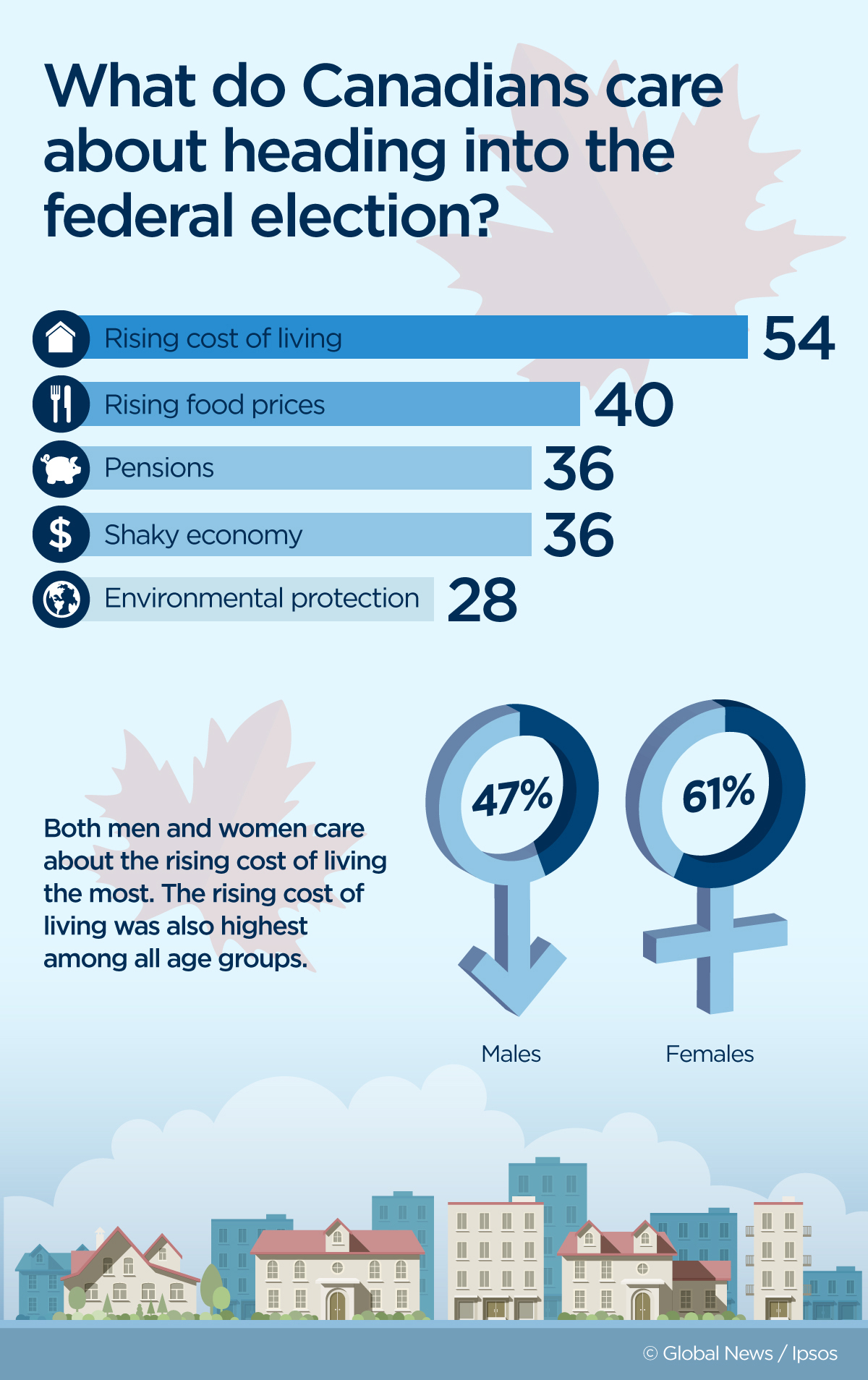WATCH: As the Federal election is looming, Global News decided to ask the public about issues they think politicians should be making a priority. The answers might surprise you. Laura Stone reports on the results of the exclusive poll.

As Canada draws closer to a federal election, how far a dollar goes and whether Canada is on the brink of recession are among the major issues for voters, according to a new Ipsos poll.
The new Ipsos poll released Wednesday was conducted on behalf of Global News and found the rising cost of living was the pre-eminent concern for Canadian voters.
“There is an overwhelming focus on the economy and it doesn’t matter whether you are someone voting for the Liberals, the NDP, or the Conservatives, it is your primary issue,” Darrell Bricker, the CEO of Ipsos said in an interview Wednesday.
Both men (47 per cent) and women (61 per cent) said the rising cost of living was among their Top 5 issues. Every age group and income level agreed.
Same with Conservative, NDP, and Liberal voters who said the rising cost of living was their main concern (55 per cent, 55 per cent, and 52 per cent, respectively).
And that could be bad news for the Liberals, Bricker said.
“When it’s a financial issue, when it’s a discussion about the economy, it’s especially hard on the Liberal party. And the reason it’s hard on the Liberal party is because usually their best issue is national unity,” he said.
It’s not clear which party stands to benefit the most from Canadian concerns about the economy; the Conservatives are typically seen as the best stewards of the economy, but a recent Nanos poll suggested 47 per cent of Canadians thought the NDP would have a positive effect on the economy. The Conservatives and Liberals made up the majority of the other 53 per cent.
The results, according to Bricker, are split evenly among the left and right sides of the political spectrum. The NDP, he said, can suggest its national childcare plan (though childcare ranked 22nd on the list) and bolstered government programs can help lower the cost of living.

Get breaking National news
A look at the latest seat projections if the election were held today. The numbers provided to Global News by the Laurier Institute for the Study of Public Opinion and Policy (LISPOP).
The Conservatives, on the other hand, can say putting more money into your pocket can help you pay the cost of living in Canada.
But the Liberals? They’re stuck in the middle, he said.
“The problem these days is that being right in the middle is where you get run over on the road,” Bricker said.
The NDP has been leading most polls since its provincial counterparts swept to power in Alberta but an Ipsos poll released Tuesday suggested it was once again a tight race as Harper’s Conservatives bounced back from a recent slide coming within one percentage point of the NDP. The Liberals are trailing in a distant third.
The poll results aren’t random — the cost of getting by in Canada has been going up. The cost of oil has gone down but gas prices haven’t, inflation has pushed up the cost of food, and house prices have risen so high the International Monetary Fund (IMF) is warning the market is “overvalued” by as much as 20 per cent.
The Canadian Centre for Policy Alternatives released a report in April saying that the living wage – the hourly rate needed to get by in a Canadian city – was far above minimum wage.
In Vancouver, the CCPA calculated the living wage was $20.68, over $10 higher than the minimum wage. It is $18.52 in Toronto, nearly $7 higher than the minimum wage.
Four of the Top 5 issues related in some fashion to either the cost of living or Canada’s economy: 40 per cent of respondents said rising food prices was among their top five concerns, 36 per cent worried about Canada’s “shaky economy,” and another 36 per cent were concerned about retirement and pensions.
Environmental protection rounded out the Top 5, as a concern of 28 per cent of respondents.
Exclusive Global News Ipsos polls are protected by copyright. The information and/or data may only be rebroadcast or republished with full and proper credit and attribution to “Global News Ipsos Reid.” This poll was conducted between July 23 and July 27, with a sample of 2,000 Canadians, including 1,571 decided voters, from Ipsos’ online panel and is accurate to within 2.5 percentage points 19 times out of 20.
Full poll results below:








Comments